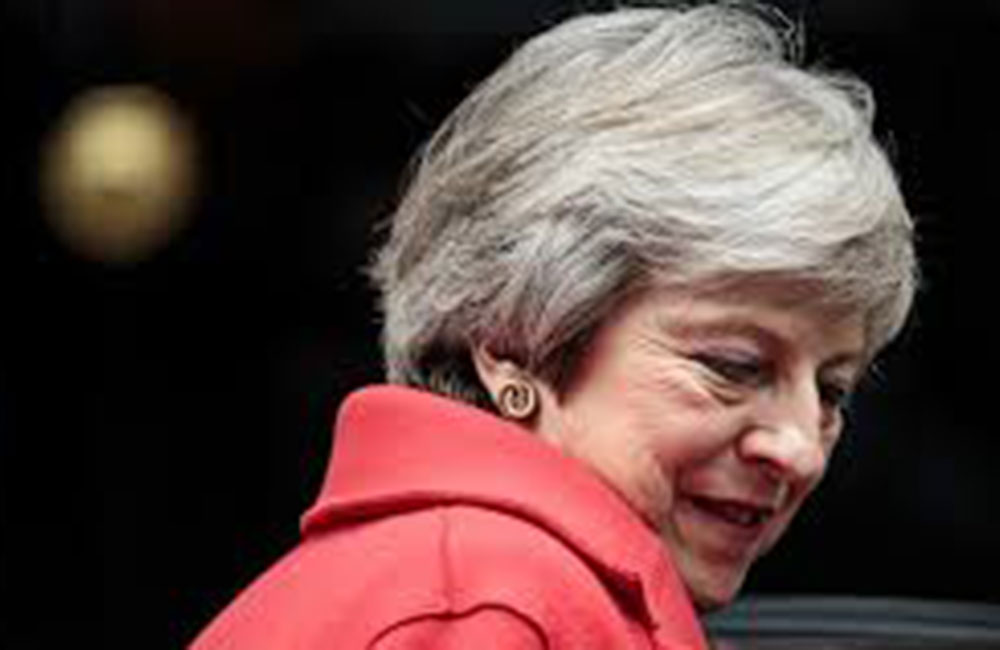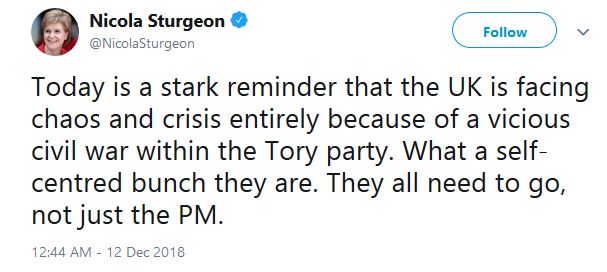Lawmakers in Britain’s Conservative Party on Wednesday triggered a “no confidence” vote against Prime Minister Theresa May, threatening her leadership as she struggles to secure a deal for Britain to leave the European Union.
May quickly responded that she would not resign but would defend her vision for Brexit. She warned the rebellious lawmakers that ousting her would not make getting a Brexit deal any easier but instead would bring delay and confusion.
“I will contest that vote with everything I’ve got,” said May, speaking outside her Downing Street offices. “I stand ready to finish the job.”
Removing and replacing the prime minister would take weeks. Changing leaders now, May warned, would “put our country's future at risk and create uncertainty when we can least afford it.”
The vote on the prime minister’s fate will take place Wednesday evening.
If a large number of her fellow Conservatives vote against her, she may be pressed to resign. If half the Conservative Party lawmakers vote against her, May would be removed.
The looming no-confidence vote throws May’s Brexit deal and Britain’s future relationship with Europe into chaos.
The prime minister on Monday announced she was delaying a vote on her deal, after she concluded that the accord faced a humiliating defeat in the House of Commons. May spent Tuesday meeting with Netherlands Prime Minister Mark Rutte, German Chancellor Angela Merkel and the E.U. leaders, trying to secure new concessions that might appease British lawmakers who oppose her Brexit withdrawal agreement.
For the Tories to challenge May, ostensibly their party leader, they need to send at least 48 letters — equaling 15 percent of the 315 Conservative lawmakers — to Sir Graham Brady, the chairman of the 1922 Committee in Parliament.
“The threshold of 15 percent of the parliamentary party seeking a vote of confidence in the leader of the Conservative Party has been exceeded,” Brady said.
Brady told the BBC that he informed the prime minister on Tuesday night that the threshold of 48 letters had been reached. May was “businesslike and keen to proceed as quickly as possible,” he said.
Brady said the no-confidence ballot would take place Wednesday evening between 6 p.m. and 8 p.m. Votes will be counted “immediately afterward and an announcement will be made as soon as possible,” he said.
For May to survive a leadership challenge, she needs a simple majority of Conservative lawmakers — 158 of 315 to support her.
May advised her fellow Tories to look at the calendar. “The new leader wouldn’t have time to renegotiate a withdrawal agreement and get the legislation through Parliament by the 29th of March,” the date when Britain is set to leave the European Union, she said.
A new leader would have to seek delay, May said. “So one of their first acts would have to be extending or rescinding Article 50, delaying or even stopping Brexit when people want us to get on with it,” she said, referring to the provision of the European Union treaty that allows members to withdraw from the bloc.
The leader of Scotland, Nicola Sturgeon, expressed her frustration with the political squabbling. She tweeted: “Today is a stark reminder that the UK is facing chaos and crisis entirely because of a vicious civil war within the Tory party. What a self-centered bunch they are. They all need to go, not just the PM.”
Top Tories in her cabinet quickly announced they would back May. Supporters include Foreign Secretary Jeremy Hunt and Home Secretary Sajid Javid.
Philip Hammond, the chancellor of the exchequer, tweeted: “The Prime Minister has worked hard in the National interest since the day she took office and will have my full support in the vote tonight. Her deal means we leave the EU on time, whilst protecting our jobs and our businesses.”
Tim Bale, a professor of politics at Queen Mary University of London, said that in practice, May would likely need to win by more than a simple majority to stay in power.
If she were to “win by 52-48, for example,” that would “indicate that so many of her MPs didn’t want her,” Bale said. “It would be morally difficult to carry on.”
Bale also said that a new leader may not solve the Conservative Party’s Brexit problems. “Is the problem actually the prime minister? The problem is what it has always been. Any deal that could pass muster with the E.U. won’t pass muster with Tory Euroskeptics.”
There is no shortage of fellow Tories who have suggested they might make fine replacements, if May is removed. Among the possible contenders are former Brexit secretary Dominic Raab and former foreign secretary Boris Johnson. Both men resigned their posts, saying they could not support May’s Brexit deal because it kept Britain too closely aligned with Europe.
“Vassalage,” Johnson called it.
Commentators were quick to draw comparisons to Margaret Thatcher, the original Iron Lady and Britain’s only other female prime minister, who won a vote of confidence on the first ballot, but resigned anyway in 1990. The party’s rules were very different then. Now, a leader cannot be challenged by a rival — a contest is triggered by the 48 letters — and needs to win by only a single vote. If May wins the vote, she cannot be challenged for a year.
If May loses the vote, she could remain as a caretaker prime minister until another leader is found, a process that could take six weeks. If multiple candidates throw their hats in the ring, then Conservative lawmakers vote, with the candidate receiving the fewest votes removed.
In the past, the voting has taken place on Tuesdays and Thursdays. Then, when two candidates are left, a vote is put to the wider grass-roots Conservative Party membership, which is more pro-Brexit than Parliament.
When David Cameron resigned as prime minister the morning after Britain’s 2016 Brexit referendum, he stayed on as caretaker prime minister for three weeks until May replaced him in July 2016. In that leadership context, the field was whittled down from five to two candidates — May and Andrea Leadsom. Leadsom dropped out after she gave an interview suggesting she was the stronger candidate because she had children.


Leave your comments
Login to post a comment
Post comment as a guest